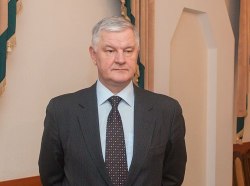Austria's OSCE chairmanship has been rather passive. Vienna has not heeded Pridnestrovie's demands to hold consultations in the "5+2" format and has avoided discussing the problem of Moldo-Ukrainian posts, said political expert Sergey Shirokov.
"In fact, the OSCE as a mediator has refused to carry out its mission and tried to impose a quite different negotiating agenda on Pridnestrovie. We have been invited to discuss the issues of land use in the Dubossary District in the PMR and Romanian-language schools rather than the issues that are really important to our country," said Shirokov.
"What is recorded in the Vienna Protocol and what is signed by the mediators and guarantors are very important for Pridnestrovie. This primarily concerns Ukraine, OSCE and, especially, Moldova's signature. The point is that as a result of the Vienna negotiations the problem of Pridnestrovian motor transport has been postponed to the next year. Besides, the Vienna Protocol has confirmed the validity of the Berlin Protocol, which claimed much effort from our negotiators and the international mediators, that has created a 'roadmap' for moving forward in relations between Kishinev and Tiraspol," noted Shirokov.
An important outcome of the "Permanent Conference..." was the reaffirmation by Kishinev and Tiraspol of the need to implement earlier agreements. "This is a serious step forward. It can be said that for the second time in five years a normal working document has been adopted, which was not the case in the '5+2' format," underscored Shirokov.
According to him, the Austrian OSCE chairmanship owes its success to Tiraspol and Moscow, which "has created a rather good negotiating document and a serious foundation for the Italian chairmanship."
Shirokov recalled that before the Vienna meeting the negotiators had signed four agreements which, in fact, closed the agenda which had existed in the past five years.
"The problems of licence numbers, land users and Romanian-language schools were imposed from outside. This prevented discussion of vital issues for Pridnestrovie. We have crossed this line today and have the opportunity to defend our interests rather than to act for the benefit of foreign partners," said Shirokov.
In terms of whether the parties will honour their earlier commitments, Shirokov noted that parliamentary elections would be held in Moldova in 2018, so it could be expected that Kishinev might not fully implement the agreements.
"We know the tactics of the Moldovan side, which always finds some extra arguments not to comply with the agreements. But this is a serious agenda for the future, for expert groups, for the Pridnestrovian MFA to work on," said the expert.
The implementation of the agreements signed by Tiraspol and Kishinev will be monitored by Italy, whose chairmanship starts on 1 January 2018. However, there is no point in expecting too much from the Italians.
"It is necessary to pursue an effective foreign policy, to mobilise and to achieve results in terms of Pridnestrovie's domestic resources in order to have the strength and ability to advocate our interests at all venues," noted Shirokov.
The expert expressed the hope that the following year would see the continuation of this foreign policy, and the Italian chairmanship would be an efficient mediator.








